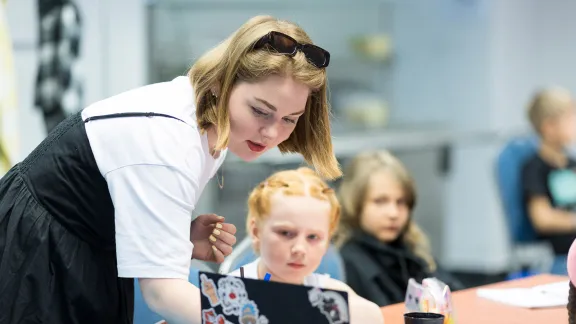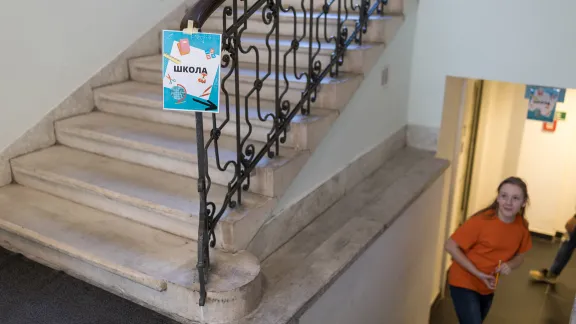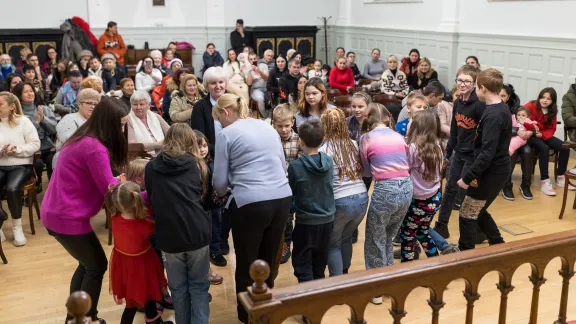
A teacher with her student. The Saturday school helps integrate refugee children into Hungarian schools, while maintaining their identity. Photo: ELCH
ELCH "Saturday school" builds connections between Ukrainian refugees and their hosts
(LWI)— For many students, weekends offer a much-needed break from school, but for the 30 students in the Saturday School of the Evangelical Lutheran Church of Hungary (ELCH), this time is dedicated to learning Hungarian and receiving academic support. This program not only helps Ukrainian children integrate into the local school system but also educates their hosts about the refugee experience.
While Ukrainian children still have a special dispensation in some host countries to continue lessons online with their Ukrainian home schools instead of enrolling in local schools, two and a half years after the start of the full-scale war many hosting countries now insist on the refugee children attending local schools in person. Otherwise, parents face cuts of benefits, fines and issues with child welfare institutions. Therefore, the newly arrived children who fled the war in Ukraine needed to learn Hungarian fast to integrate into the local school system successfully.
Workshops in the host schools
Launched in November 2022 by ELCH and Hungarian Diakonia, the project was initially set for six months but has since been extended. Students aged 7-14 improve their Hungarian and English language skills while practicing Ukrainian and receiving help with subjects like math and history.

Die Samstagsschulen in den Gebäuden der Kirche. Foto: ELKU
Feedback from parents and children indicated that this support helped them deal with schoolwork and lose anxiety about being unable to keep up. But the "Saturday School" is much more than weekend tutoring. While the Ukrainian children work hard to improve their language skills and integrate into their host communities, a group of 12 trainers on weekdays goes to the local schools attended by the refugee children to raise awareness about the situation and the challenges of young refugees, and foster a better understanding between new arrivals and hosts.
"During the workshop, there was an opportunity to dispel misconceptions about refugees. The participants, students from the local communities, experienced, through situational exercises, the prejudices and difficulties that refugees face," says the ELCH project coordinator Róbert Oláh. Moreover, the workshop participants will be able to use the acquired problem-solving capacities in other settings.

Gemeinsame Feste wie z. B. Weihnachtsfeiern gehören zum Schulleben dazu. Ein Mädchen hält eine Tüte mit Süßigkeiten für Weihnachten. Foto: ELKU
We find it important to improve their communicative skills so they can be understood in the host country
Robert OLAH, Project Coordinator ELCH
Indirect benefits
Projectcoordinator Oláh hopes that the language classes and these awareness-raising workshops will benefit not only the Ukrainian children but also the entire school community. The Saturday school will continue in partnership with the education department of ELCH, running from 1 July 2024 to the end of the school year in June 2025.

Schülerinnen und Schüler bei einer Aufführung in der Kirche. Die Schulen helfen bei der Integration in die lokale Bevölkerung. Foto: ELKU
"We find it important to improve their communicative skills so they can be understood in the host country," Oláh says. "Another important element of the Saturday school would be learning about the host culture." The extra time spent in the school room will be complemented with summer camps and field trips – giving the children opportunities to learn about their host country and to make new friends.


